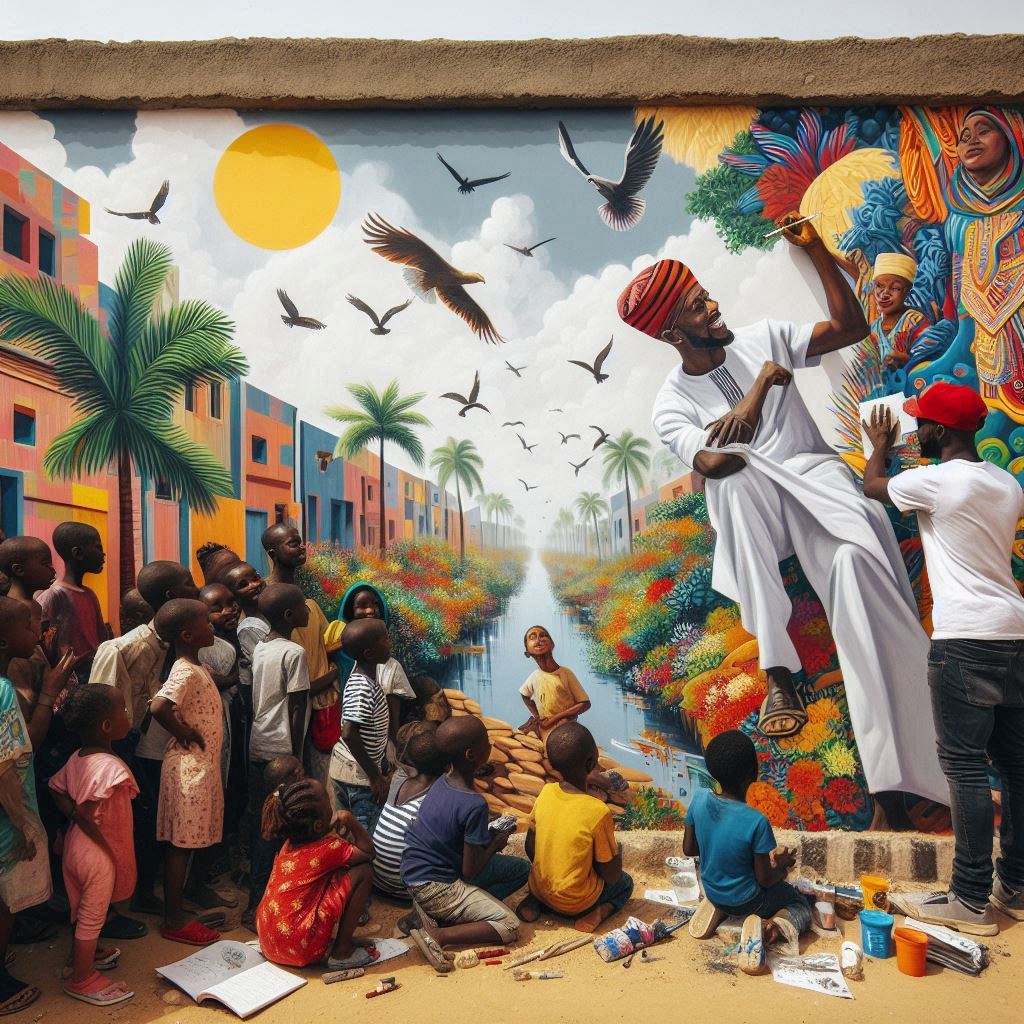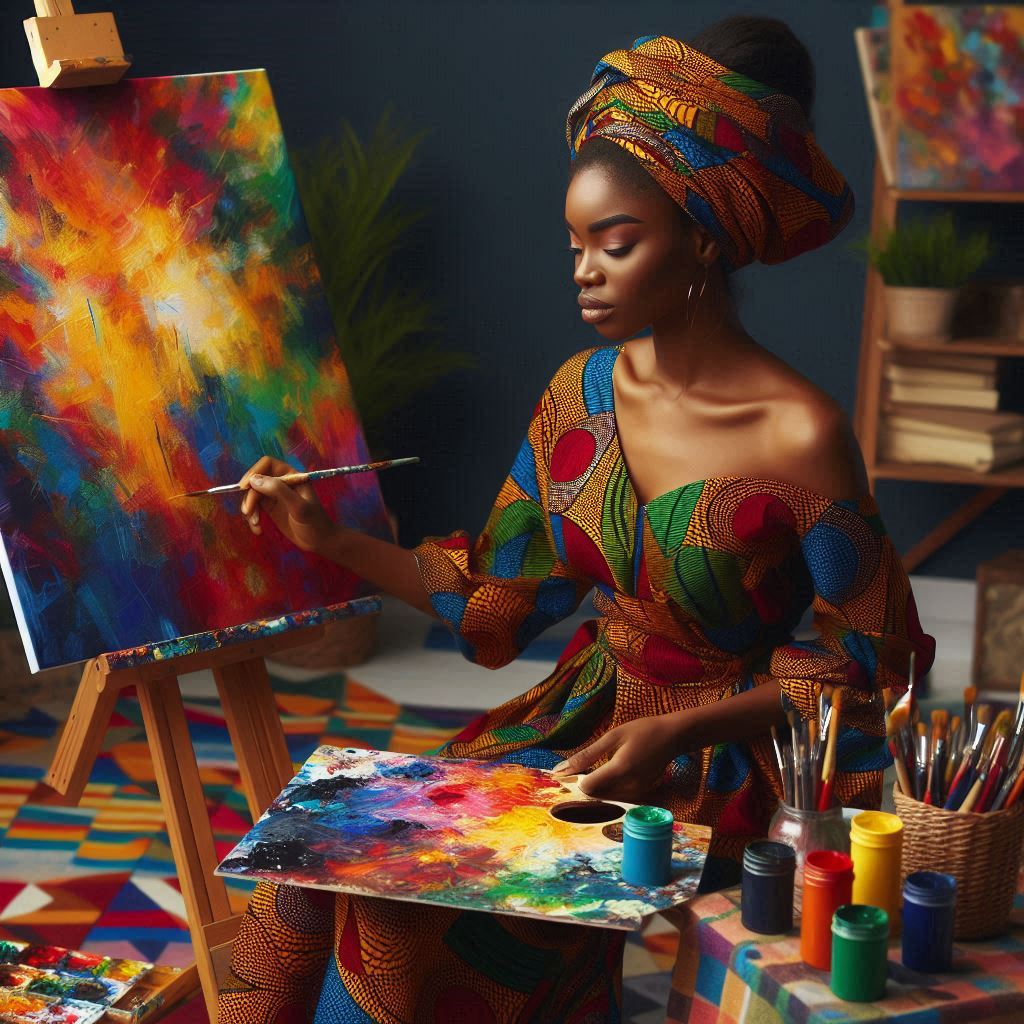Introduction
Nigerian arts embody the nation’s rich cultural heritage.
They showcase a vibrant tapestry of traditional and contemporary forms.
Artists use their work to address and highlight social issues affecting Nigerian society.
Visual arts, music, dance, and literature often convey powerful messages about politics, inequality, and human rights.
This connection stems from a deep-rooted tradition where art serves as a societal mirror.
Nigerian artists express concerns through their creative expressions, engaging audiences in critical discourse.
Their works provoke thought, inspire action, and foster social change.
By examining Nigerian arts, we can understand how they reflect social issues.
This exploration reveals the profound impact of art on society.
Nigerian artists skillfully depict the struggles and triumphs of their people.
Their creations not only entertain but also educate and advocate for social justice.
In this section, we will explore how Nigerian arts reflect and respond to social issues.
Traditional Nigerian Art Forms
Description of Traditional Art Forms
Nigeria is home to a diverse range of traditional art forms that have been passed down through generations.
Tribal masks, sculptures, and textiles are some of the most prominent examples of Nigerian art.
Traditional tribal masks are known for their intricate designs and symbolic meanings.
These masks are used in ceremonies and rituals, reflecting the spiritual beliefs and cultural practices of different Nigerian tribes.
Nigerian sculptures often depict figures from folklore, mythology, and everyday life.
These sculptures serve as a visual language, telling stories and conveying messages that are important to the community.
Textiles in Nigeria are rich in color and pattern, with each design carrying its own significance.
Textiles are often used to make clothing, accessories, and household items, reflecting the creativity and craftsmanship of Nigerian artisans.
Analysis of Art Forms Reflecting Social Issues
Traditional Nigerian art forms play a crucial role in reflecting social issues such as gender roles, politics, and religion.
These art pieces serve as a visual commentary on the challenges and dynamics within Nigerian society.
Gender roles are a significant social issue that is often portrayed in Nigerian art.
Traditional artworks may depict scenes that challenge traditional gender norms or illustrate the struggles faced by women in Nigerian society.
Politics is another common theme in Nigerian art, with many artists using their work to comment on government corruption, power struggles, and the impact of political decisions on the lives of ordinary citizens.
Religion also plays a prominent role in traditional Nigerian art.
Art pieces may explore themes of spirituality, religious practices, and the intersection of traditional beliefs with modern ideologies.
Examples of Art Pieces Highlighting Social Issues
One example of a traditional Nigerian art piece that highlights social issues is the Gelede mask.
The Gelede mask is used in Yoruba culture to honor women and challenge gender stereotypes.
Another example is the Nok terracotta sculptures, which date back to around 500 BC.
These sculptures depict human figures in various poses, providing insight into the social structure and cultural practices of ancient Nigerian societies.
Adire textiles, a type of indigo-dyed cloth, often feature motifs that symbolize political resistance and social change.
These textiles are used as a form of protest and a means of expressing dissent against oppressive regimes.
Generally, traditional Nigerian art forms offer a unique insight into the social issues that have shaped Nigerian society.
From gender roles to politics and religion, these art pieces serve as a powerful reflection of the complexities and nuances of Nigerian culture.
Read: Psychological Impact of COVID-19 on Nigerians
Contemporary Nigerian artists
Contemporary Nigerian artists play a crucial role in addressing social issues through their work.
They use various mediums like painting, sculpture, and performance art to convey deeply rooted societal concerns.
Exploration of modern Nigerian artists
Several contemporary Nigerian artists have gained international recognition for their ability to tackle pressing social issues through their art.
Artists like Njideka Akunyili Crosby, Owanto, and Peju Alatise are just a few examples of the talent emerging from Nigeria.
These artists often draw inspiration from their surroundings and personal experiences to create impactful pieces that challenge the status quo.
They confront issues such as corruption, poverty, gender inequality, and environmental degradation in their work.
How artists use various mediums
Painting, sculpture, and performance art are the primary mediums through which Nigerian artists express their perspectives on social issues.
Each medium allows the artist to communicate different aspects of the problem they are addressing.
For example, painting offers a visual representation of the issue, allowing viewers to engage with the artwork on a deeper level.
Sculpture, on the other hand, adds a tactile element to the message, inviting viewers to physically interact with the piece.
Performance art, with its emphasis on live, interactive experiences, can create a more immediate impact on the audience.
By utilizing these various mediums, artists can reach a broader audience and evoke different emotional responses.
Examination of specific contemporary artworks
Several contemporary Nigerian artists have created powerful artworks that tackle social issues head-on.
One such artist is Victor Ehikhamenor, whose work often addresses political corruption and its impact on society.
His series of paintings titled “Blood on the Leaves” delves into the complex web of corruption in Nigeria and the devastating consequences it has on the country’s people.
Through striking imagery and symbolic motifs, Ehikhamenor exposes the harsh realities of political corruption in Nigeria.
Another artist, Ndidi Dike, explores themes of poverty and environmental degradation in her sculptural installations.
Her piece “Waste-Not” is a commentary on the wasteful consumer culture and its detrimental effects on the environment.
Dike uses found objects and recycled materials to create thought-provoking installations that challenge viewers to reflect on their own consumption habits and their impact on the world around them.
Overall, contemporary Nigerian artists are using their talents to shine a spotlight on the pressing social issues facing their country.
Through their diverse mediums and powerful imagery, they are sparking important conversations and inspiring change in Nigerian society.
Read: Challenges in Teaching Christian Religious Studies
Influence of Colonial History on Nigerian Arts
Examination of the impact of British colonization on Nigerian art and culture
British colonization had a profound impact on Nigerian art and culture, shaping artistic expression in various ways.
- Colonialism influenced the themes depicted in Nigerian art, often showcasing resistance, resilience, and cultural identity.
- Artists used their work to address the legacy of colonialism, shedding light on its lasting effects on Nigerian society.
- Traditional Nigerian art forms were sometimes suppressed or altered under British rule, leading to a fusion of indigenous and colonial influences.
- The introduction of Western artistic techniques and styles during colonization influenced the evolution of Nigerian art, creating new forms of expression.
Analysis of How Colonialism Influenced Artistic Expression and Themes in Nigeria
Colonialism not only affected the content of Nigerian art but also the way artists approached their craft.
- Many artists began to incorporate elements of resistance and liberation in their work, reflecting the struggle for independence from colonial rule.
- Traditional art forms like beadwork and sculpture evolved to incorporate new materials and techniques introduced by British colonizers.
- Nigerian artists explored themes of identity, power dynamics, and cultural heritage in response to the colonial experience.
- Art became a tool for addressing historical injustices, reclaiming narratives, and challenging colonial perspectives on Nigerian society.
How Nigerian Artists Use Their Work to Address the Legacy of Colonialism and Its Effects on Society
Nigerian artists continue to engage with the legacy of colonialism through their art, highlighting the ongoing impact of history on contemporary society.
- Artistic expressions of post-colonial identity explore themes of hybridity, cultural exchange, and the complexities of a fractured history.
- Artworks often challenge colonial narratives, offering alternative perspectives on Nigerian history and disrupting dominant power structures.
- Artists use their platforms to confront unresolved issues stemming from colonialism, such as inequality, exploitation, and cultural appropriation.
- Through their art, Nigerian artists foster dialogue, promote social change, and advocate for a more inclusive and equitable society.
Read: Psychology and Counseling Services in Nigerian Schools

Role of Nigerian arts in activism
How Nigerian artists use their work to raise awareness and provoke social change
Nigerian artists have long been using their creative talents to shine a spotlight on important social issues.
Through various forms of art such as music, visual arts, film, and literature, they are able to convey powerful messages that resonate with the masses.
Artists often draw inspiration from their surroundings and personal experiences to create thought-provoking works that challenge societal norms and spark conversations.
Analysis of art as a tool for activism and advocacy in Nigeria
Art has the unique ability to transcend language barriers and connect with people on an emotional level.
In Nigeria, where issues such as corruption, poverty, gender inequality, and political unrest are prevalent, artists play a crucial role in advocating for change.
By using their art as a platform for activism, they are able to amplify voices that are often marginalized and bring attention to injustices that need to be addressed.
Specific instances where Nigerian artists have used their platform to address pressing social issues and inspire action
One notable example is the late legendary musician Fela Kuti, who used his Afrobeat music to criticize the Nigerian government and advocate for human rights.
His songs like “Zombie” and “Sorrow, Tears, and Blood” became anthems for social justice movements.
Similarly, visual artists like Ty Bello have used their photography to document the plight of internally displaced persons in Nigeria, bringing attention to the humanitarian crisis in the country.
In the film industry, directors like Kunle Afolayan have produced movies that tackle issues such as corruption and cultural identity, sparking conversations and encouraging viewers to reflect on the state of society.
Furthermore, writers like Chimamanda Ngozi Adichie have used their novels to address themes of feminism, colonialism, and cultural hybridity, shedding light on complex social issues in Nigeria.
Overall, Nigerian artists continue to use their creative platforms to challenge the status quo, raise awareness about pressing social issues, and inspire action towards positive change.
Through their art, they are able to engage audiences in meaningful dialogue, provoke critical thinking, and contribute to the ongoing fight for a more just and equitable society.
Read: How Nigerian Schools Address Student Psychology
Find Out More: Extracurricular Activities in Nigerian Music Schools
Gain More Insights: Challenges Facing History & Strategic Studies in Nigeria
Representation of gender, ethnicity, and class in Nigerian arts
Gender Equality in Nigerian Arts
Nigerian artists have long been at the forefront of advocating for gender equality through their work.
They use various art forms such as painting, sculpture, and performance art to shine a light on the struggles faced by women in Nigerian society.
These artists depict themes of empowerment, resilience, and resistance against patriarchal norms.
By showcasing powerful female figures in their art, Nigerian artists challenge societal norms and stereotypes that have historically oppressed women.
Their work serves as a platform for raising awareness and inspiring change in attitudes towards gender roles.
Ethnic Diversity in Nigerian Arts
Nigeria is a country rich in ethnic diversity, with over 250 different ethnic groups.
Nigerian artists often reflect this diversity in their work by celebrating the unique cultural heritage of each group.
Through their art, they promote unity, tolerance, and appreciation for the richness of Nigeria’s cultural tapestry.
By depicting scenes of cultural festivals, traditional ceremonies, and everyday life of different ethnic groups, Nigerian artists foster a sense of pride and belonging among Nigerians.
They highlight the beauty and complexity of Nigeria’s multicultural society, challenging stereotypes and promoting intercultural dialogue.
Socioeconomic Disparities in Nigerian Arts
Nigerian artists also address issues of socioeconomic disparities in their work, shedding light on the harsh realities faced by marginalized communities.
Through their art, they confront issues such as poverty, inequality, and lack of access to basic resources and opportunities.
By portraying the struggles of the less privileged in Nigerian society, artists advocate for social justice and equity.
They use their art as a tool for raising awareness, building empathy, and advocating for positive change to address the root causes of poverty and inequality.
Artists Empowering Marginalized Communities
Nigerian artists play a crucial role in empowering marginalized communities through their art.
They create platforms for marginalized voices to be heard, amplify their stories, and provide a space for self-expression and advocacy.
By showcasing the resilience and strength of marginalized groups, artists challenge stereotypes and promote inclusivity.
Through collaborative projects and community-based initiatives, Nigerian artists engage with marginalized communities to co-create art that reflects their lived experiences and aspirations.
This collaborative approach fosters a sense of solidarity, respect, and mutual understanding, leading to empowerment and social change.
Contribution to Conversations about Identity and Belonging
Nigerian arts contribute significantly to conversations about identity, belonging, and social justice.
Artists explore themes of cultural identity, national pride, and belonging through their work, inviting audiences to reflect on their own sense of self and belonging in a diverse society.
By addressing issues of discrimination, exclusion, and marginalization, Nigerian artists spark conversations that challenge societal norms and promote unity and understanding.
Their art serves as a powerful tool for promoting social cohesion, fostering empathy, and building bridges across cultural divides.
Overall, Nigerian artists play a vital role in addressing social issues related to gender, ethnicity, and class through their work.
By challenging stereotypes, empowering marginalized communities, and contributing to conversations about identity and social justice, Nigerian arts serve as a catalyst for positive change in Nigerian society.
You Might Also Like: Top Performing Arts Schools in Nigeria
Explore Further: History of Mass Communication Education in Nigeria
Find Out More: Environmental Studies in African and Asian Context
Collaboration between artists and communities
Partnerships between Nigerian artists and local communities to address social issues
In Nigeria, collaboration between artists and communities plays a crucial role in addressing social issues.
By working together, artists and local residents can create powerful art projects that spark dialogue, promote healing, and foster social cohesion.
Partnerships between Nigerian artists and communities often begin with a shared goal of addressing pressing social issues.
These collaborations allow artists to gain insight into the challenges faced by local communities, while also providing community members with a platform to voice their concerns.
Analysis of how collaborative art projects promote dialogue, healing, and social cohesion
One example of a successful collaboration is the “Nigerian Art for Social Change” initiative, where artists work closely with community members to create art that reflects their experiences and aspirations.
Through this project, artists have been able to shine a light on issues such as poverty, corruption, and gender inequality.
Collaborative art projects not only raise awareness about social issues but also serve as a form of therapy for both artists and community members.
Creating art together allows individuals to express their emotions and heal from trauma, fostering a sense of unity and solidarity within the community.
The Impact of community-based Art Initiatives on Grassroots Activism and Social Change in Nigeria
Moreover, these community-based art initiatives have a significant impact on grassroots activism and social change in Nigeria.
By amplifying the voices of marginalized groups and shedding light on injustices, artists and community members can mobilize support for policy changes and advocate for a more equitable society.
All in all, collaboration between artists and communities in Nigeria is a powerful tool for addressing social issues and driving positive change.
Through partnerships that promote dialogue, healing, and social cohesion, artists and local residents can work together to create a more just and inclusive society.
Explore Further: Funding Challenges in Nigerian Arts
Conclusion
Throughout Nigerian history, the arts have been a powerful tool for reflecting social issues.
Artists use their work to shed light on political, economic, and cultural challenges facing their society.
One example is the Nigerian music industry, where musicians often incorporate social commentary into their lyrics.
Songs address corruption, inequality, and the struggles of everyday life, connecting listeners to the realities of their country.
In the visual arts, Nigerian artists use paintings, sculptures, and photography to highlight social injustices.
Works depict poverty, violence, and environmental degradation, prompting viewers to confront uncomfortable truths.
Literature is another key medium through which Nigerian writers explore social issues.
Through novels, poems, and plays, authors tackle themes such as colonialism, gender inequality, and ethnic tensions, sparking important conversations about the country’s past and present.
As demonstrated, Nigerian arts serve as a mirror of social issues, offering unique insights into the challenges facing the nation.
Through artistic expression, dialogue, empathy, and positive change can be promoted in society.
It is essential for readers to engage with Nigerian arts as a means of understanding and addressing social issues.
By supporting artists and consuming their work, individuals can contribute to a more informed and empowered society.




